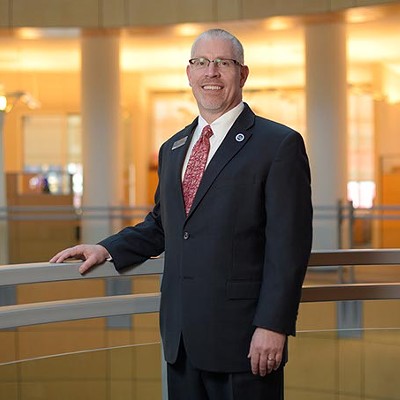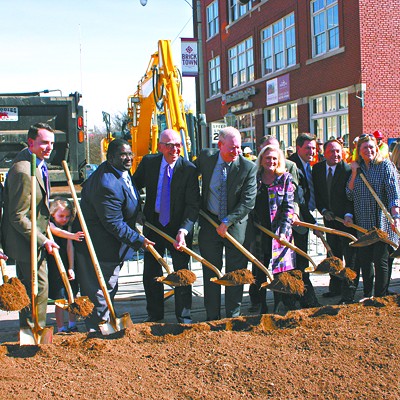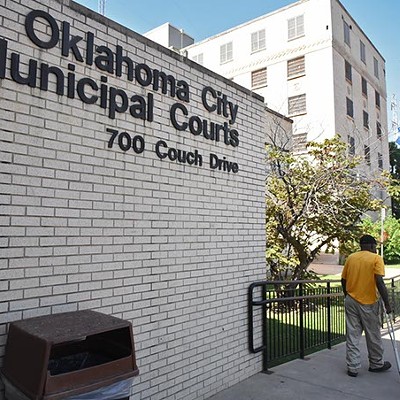Shadid, who was rescued and survived the sniper’s gunshot, said he remembers the feeling of resignation that washed over him that day as he stared up at the unforgiving gray sky, accepting what he thought was his fate.
Nine years later, that same feeling returned like an unwelcome visitor as Shadid and three other New York Times journalists were captured, lined up and told by armed Libyan government forces to get on their knees, then to lie face down.
“It felt like minutes though it was probably only a few seconds, someone came up and told us to get on our stomachs. We thought we were going to be shot, and to be blunt, shot in the back of the head,” Shadid said in a telephone interview with Oklahoma Gazette from Beirut.
“I heard some guy in Arabic say, ‘Shoot them.’” Shadid, a 1986 graduate of Heritage Hall, serves as Beirut bureau chief for The New York Times. A two-time Pulitzer Prize winner for international reporting, he has covered the Israeli- Palestinian conflict, the 2006 Lebanon War, the U.S. invasion and withdrawal from Iraq, and has authored two books about Middle Eastern conflicts.
In mid-February, protests took over North Africa when an unyielding rebel movement emerged in Libya, and protesters there were met with violence by government forces controlled by Col. Moammar Gadhafi.
Protesters fought Gadhafi’s forces and captured several Libyan cities. This was met with full-scale bombardment and military strikes as government forces tried to retake those areas.
Shadid and three other Times journalists — reporter and videographer Stephen Farrell and photographers Lynsey Addario and Tyler Hicks — crossed the Egyptian border into Libya without visas.
On March 16, the four were reported missing. It was later learned that pro-Gadhafi forces had captured them. After Turkish ambassadors were able to secure the journalists’ freedom, on March 21, the four were released and taken across the Tunisian border.
On March 22, the Times published the journalists’ account. In a recent interview with the Gazette, Shadid recounted some of what happened.
The journalists were in the city of Ajdabiya, which was held by rebel forces in the face of advancing government forces. The city sits on the outskirts of the opposition capital of Benghazi, and Shadid said they knew if the government re-took the city, it would control a key road to the Egyptian border — the same the four journalists had used to enter the country.
There had been rumors that Gadhafi’s forces had already entered the city, Shadid said, and though the journalists didn’t believe it at first, after several people told them it was true, they decided to leave.
Within a mile of the city, the group’s car was stopped at a checkpoint manned by pro-Gadhafi forces. Soldiers pulled the four out of the car and began slapping them around, Shadid said, but almost as soon as they were out of the car, gunfire erupted.
The checkpoint came under fire from rebel forces, Shadid said, and the journalists decided to try to escape.
“This was kind of a scary moment.
Within seconds, a gun battle started. They were shooting at us basically; the rebels were attacking that checkpoint. We had to make a call right there whether to run for it,” Shadid said. “All four of us tried to run away from these guys arresting us, and these guys were trying to keep hold of us and fight the rebels at the same time.”
The four took cover behind a oneroom house where soldiers were waiting, the Times reported. The soldiers beat them, took everything out of their pockets and bound them, forcing them to their knees, Shadid said. After a few seconds, another soldier walked up and told them to lie prone on the ground.
Everyone knew what came next. “We didn’t freak out; you just kind of make peace with the fact it was almost over,” he said. “You don’t get frantic, you don’t freak out, at least the people I was with didn’t. You just make peace with the fact it’s almost over.
“I hadn’t felt that in 10 years almost.”
The order was given to shoot them, but one of their captors interjected.
“I heard someone else say ‘You can’t, they’re Americans,’” Shadid said.
The four were put in trucks, all the while being punched and kicked, he said. In the chaos, the group’s driver, Mohammad, had gone missing. One of the journalists saw a body near the car they had been riding in, though they were unsure it was him.
“If he died, we will have to bear the burden for the rest of our lives that an innocent man died because of us, because of wrong choices that we made, for an article that was never worth dying for,” the journalists wrote. “No article is, but we were too blind to admit that.”
After another gun battle the following day, the journalists were handed over to another group of soldiers who took them to a different location, questioned and transferred them to yet another location. The whole time, soldiers were groping Addario, and threatening and beating all four of them, they wrote.
During the third day of captivity, the group was taken to the airport at Surt, where they were beaten. Shadid, who was handcuffed and blindfolded much of the time, said he was hit in the head with the butt of a pistol.
“The first 72 hours we were treated pretty roughly,” Shadid said. “You see these guys handcuffed and blindfolded, and you don’t think much of it till it happens to you.”
From there, the four were flown to Tripoli and kept for four days. They could hear the antiaircraft fire as the United Nations began enforcing its no-fly zone.
Eventually, Turkish diplomats were able to secure the group’s release and they were taken across the border to Tunisia.
“We
were out of hellish circumstances and in five-star hotel,” Shadid said.
“Here I was at this five-star hotel, and I couldn’t even enjoy it. I
went to bed.”
Buddy Shadid, Anthony’s father who lives in Oklahoma City, said he was bombarded with calls offering prayer and support.
“I’m
thrilled, but I’m just exhausted,” the elder Shadid said. “This
up-and-down has taken its toll. The people in Oklahoma, I appreciate
them so much. There was so much support, people extending their sympathy
and prayers. There’s nobody like people in Oklahoma. They’re the best.”
Anthony Shadid also expressed appreciation for his native state.
“It’s
amazing to me the outpouring and affection in Oklahoma,” said Shadid,
the cousin of OKC City Council candidate Ed Shadid. “Everyone was so
decent and supportive. It really meant a lot to me. I haven’t lived in
Oklahoma since I was 18, but I feel very much a part of that place.”
The
journalist said he was going to take some time off to relax with his
wife and child in the restored house once owned by his grandparents in
southern Lebanon. He doesn’t know how many wars he has left in him.
“I
think I’m getting too old for it,” he said. “I had that one close call.
I had my brush with death, and I wasn’t going to have it again, and I
had it again. I’ve never been lucky in anything except journalism, and I
wonder if my luck in journalism is running out.”











